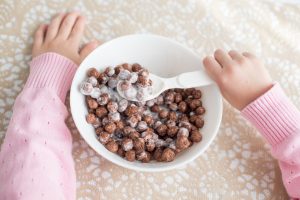Are Children Eating Cereal Containing the Weedkiller Roundup?
Earlier this year, the manufacture of the popular herbicide, Roundup, was found to be liable in a series of product liability lawsuits and ordered to pay a total of $2 billion in punitive damages. In addition to these cases, there are approximately 13,400 others who are waiting for their case to be heard, all of whom claim that glyphosate, the chemical found in Roundup, is responsible for their cancer diagnoses.

Photo Credit: Denis Makulov / Shutterstock.com
Over the years, Roundup has been used to treat crops across the United States. It is also used as a desiccant, or a drying agent, that is sprayed onto crops – especially oats – just before they are harvested. Farmers use glyphosate to kill the crop so that it dries out faster, allowing manufacturers to process the oats more quickly. As a result, it has been suggested that high levels of glyphosate can be found in certain oat products. Thus, the dangerousness of Roundup may not only affect adults who used the product, but also anyone who consumes food containing glyphosate.
Concerned about this very possibility, the Environmental Working Group (EWG) conducted a test on 21 common oat products. According to the recent study, of the 21 common oat-based cereal and granola products that were tested, all contain glyphosate and 17 contain dangerous levels of glyphosate.
The EWG recommends that children do not consume products that contain more than 160 parts per billion (ppb) of glyphosate. All but four of the 21 products tested by the EWG exceeded 160 ppb of glyphosate. Below is a list of products with the highest concentration of glyphosate:
- Honey Nut Cheerios Medley Crunch (833 ppb)
- Cheerios Toasted Whole Grain Oat Cereal (729 ppb)
- Nature Valley Crunchy Granola Bars, Maple Brown Sugar (566 ppb)
- Nature Valley Granola Cups, Almond Butter (529 ppb)
Other products, including Chocolate Peanut Butter Cheerios, Nature Valley Baked Oat Bites, and Oat and Honey Nature Valley Granola Bars, also had a significant concentration of glyphosate. It is worth noting that the Environmental Protection Agency (EPA) has a much higher threshold for glyphosate, claiming that up to 310 part per million is acceptable, even for young children.
Food manufacturers have a duty to ensure that the products they sell are safe for human consumption, regardless of someone’s age. Generally, these claims are based on a theory of strict liability, meaning that a plaintiff does not need to show that the manufacturer knew or even should have known about the dangers associated with their product.
Is Your Child at Risk?
If your child recently and unexpectedly developed non-Hodgkins lymphoma (NHL), contact Moll Law Group. At Moll Law Group, we represent consumers in product liability claims in hopes of making products safer for everyone. By holding large food manufacturers accountable, we can help ensure that they conduct the necessary diligence before releasing a product to market. We represent clients throughout the nation in product liability claims. To learn more about how we can help you pursue a claim for compensation based on the injury your child has sustained, call 312-462-1700 to schedule a free consultation today. Calling is free, and because we work on a contingency basis, you will not be billed unless we can help you recover financial compensation.
 Illinois Injury and Mass Tort Lawyer Blog
Illinois Injury and Mass Tort Lawyer Blog

